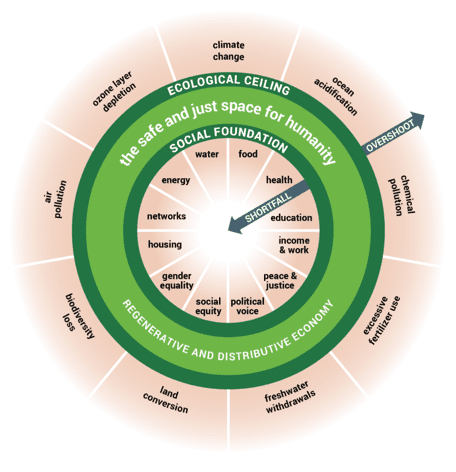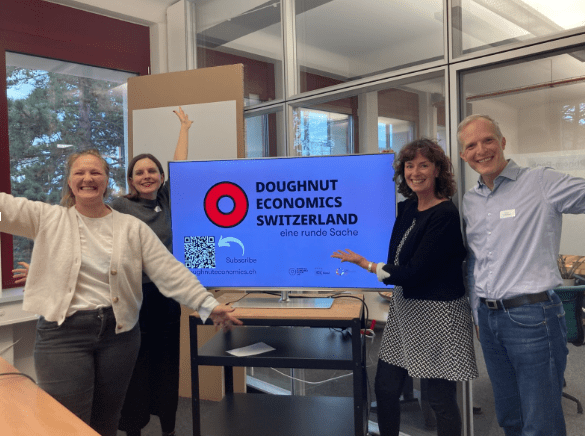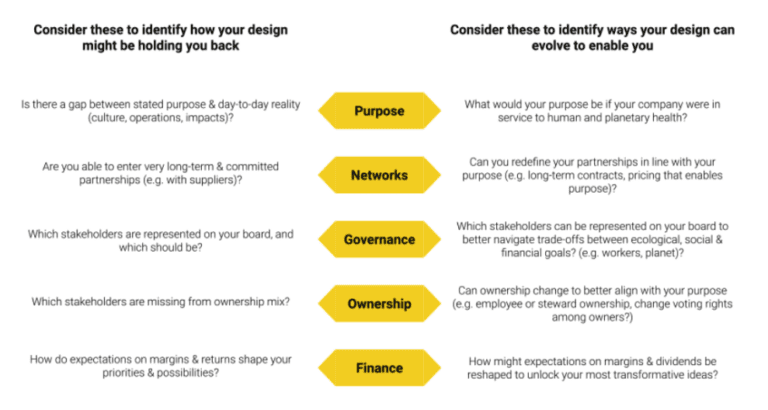Donut Day 2024
Donut Day 2024 – by Anja Nieveler
In celebration of Donut Day this year, we took some time to reflect on our journey over the last two years with Donut Economics at Impact Hub Basel—a journey marked by collaboration and an evolving vision for regenerative change.
Our engagement with Doughnut Economics began in autumn 2022 when we first connected with Erinch Sahan from the Doughnut Economics Action Lab (DEAL). At the time, DEAL was developing its tool for businesses, and we were fortunate to bring together a diverse group of organisations and companies from Basel to test it out and provide feedback.
From the outset, we were drawn to the framework’s core belief: a sustainable society is one that enables a good life for all within planetary boundaries. It offered a holistic view, integrating sustainability and human rights—often treated separately—and helped showcase how deeply these areas are intertwined.


Today’s businesses confront challenges unlike those faced even a few decades ago. New, accessible tools are essential to guide innovative thinking, and the Doughnut model is an example of such a tool. Over the past two years, we have integrated it across our programs and workshops: from running sessions within our health program, Lafiya Innovators, with startups from the Global South to hosting workshops for companies in Basel and delivering lectures at universities. We also co-founded the Swiss Donut Economics Network, which aims to broaden the impact and understanding of the framework across Switzerland.
“Kate Raworth says very aptly: In terms of the doughnut, all countries are developing countries. In Switzerland, the challenge lies especially in harmonising our economy with the planetary boundaries. I also see great value in drawing a new target picture of what purpose the economy actually fulfills” – David Brühlmeier, Swiss Donut Economic Network Co-President
A question we often debate is whether Donut Economics is only for the idealistic. Is a “good life for all within planetary boundaries” truly feasible? A recent study by scientists from EMPA and the Technical University of Braunschweig, titled “Measuring the Doughnut: A Good Life for All is Possible within Planetary Boundaries,” suggests that it is (maybe). However, achieving this vision will require significant change.
While we see increasing interest from the European Commission, the Swiss Government, and universities, major corporations have been slower to engage with the model. Startups, with their flexibility, may hold one key to leading this transformation, and we’ve embraced this belief through our Pilot Plus Incubator, where the Donut is one framework alongside Circular Economy principles. In this incubator, we introduce the concept of “deep design,” inspired by economic theorist Marjorie Kelly. This approach is deeply powerful to me. It encourages startups to look beyond isolated ideas or projects and assess what enables or inhibits sustainable change at a structural level. By embedding strategic goals within their ownership models, financial setups, and mission statements, startups can lay a foundation that remains resilient and purpose-driven, regardless of leadership changes.

We have also integrated the principles of Doughnut Economics into our new strategy. We are now focusing more on inclusion and equity, particularly for underrepresented groups, such as women, in entrepreneurship. Simultaneously, we are reinforcing our support pipeline for regenerative and circular businesses. Our aim is to ensure these efforts are interconnected, creating solutions with long-lasting, positive impacts on society and the planet. These are topics and challenges rooted in our local ecosystem.
In the coming years, we hope to see larger companies embrace the Doughnut framework to shape their social and environmental strategies. We envision new programs and collaborations — locally, in Switzerland, and globally with other Impact Hubs, with cities, companies, and organisations — that harness Doughnut Economics to inspire collective action. We remain committed to advocating for a sustainable future that safeguards planetary boundaries while supporting humanity’s well-being.
